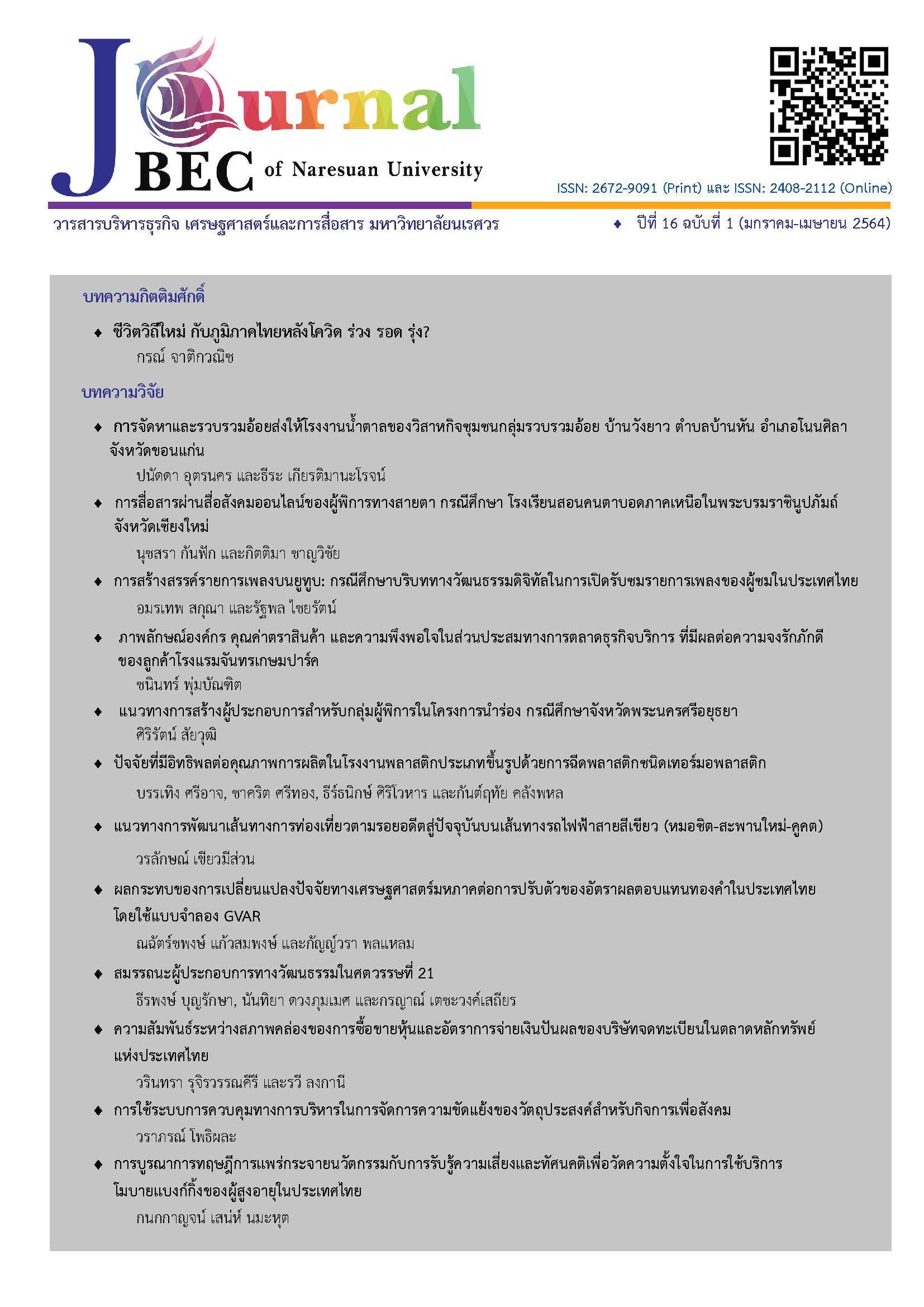สมรรถนะผู้ประกอบการทางวัฒนธรรมในศตวรรษที่ 21
Main Article Content
บทคัดย่อ
บทความวิจัยนี้มีวัตถุประสงค์เพื่อค้นหาสมรรถนะที่โดดเด่นของผู้ประกอบการทางวัฒนธรรมในศตวรรษที่ 21 โดยใช้วิธีการถอดบทเรียนจากประสบการณ์ของผู้ประกอบการทางวัฒนธรรมที่ประสบความสำเร็จจำนวน 10 องค์กร นำมาวิเคราะห์และสังเคราะห์เพื่อค้นหาสมรรถนะผู้ประกอบการทางวัฒนธรรม และองค์ประกอบของสมรรถนะดังกล่าว ผ่านกระบวนการในการประกอบการทางวัฒนธรรม ผลการศึกษาพบว่า ผู้ประกอบการทางวัฒนธรรมที่ประสบความสำเร็จมีสมรรถนะที่โดดเด่นจำนวน 9 สมรรถนะ ได้แก่ (1) ด้านลูกค้า (2) ภูมิปัญญาท้องถิ่น (3) วัตถุดิบ (4) การเงิน (5) ทรัพยากรมนุษย์ (6) การออกแบบนวัตกรรม (7) การผลิตและให้บริการ (8) การสื่อสารคุณค่า และ (9) การบริหารธุรกิจและภาวะผู้นำ งานวิจัยยังได้พบว่าภายใต้สมรรถนะผู้ประกอบการทางวัฒนธรรมยังแบ่งออกได้เป็น 2 องค์ประกอบ คือ “สมรรถนะทางใจ” ประกอบด้วย การรับรู้ในความรู้สึก ความรู้ และความคิด และ “สมรรถนะทางกาย” โดยได้แสดงผลลัพธ์การสังเคราะห์องค์ประกอบในสมรรถนะต่างๆ และได้นำเสนอความเชื่อมโยงการทำงานขององค์ประกอบต่าง ๆ เพื่อสร้างสมรรถนะผู้ประกอบการทางวัฒนธรรมในศตวรรษที่ 21 ไว้ในรูปของแบบจำลอง
Article Details
เอกสารอ้างอิง
Bhuapisit, P., Supadilokluk, R., Taiwan, A. & Chaiwan, W. (2015). A study of competencies of community enterprise (OTOP) entrepreneurs in the central region of Thailand toward ASEAN economic community. Research report. Bangkok: Rajamangala University of Technology Phra Nakhon, Bangkok.
Khamnunwat, D., Bhibulbhanuvat, S., Thawornpat, M., Boonrugsa, T. & Suraratdecha, S. (2016). Balanced culture: increase worth with creative values. Nakhon Pathom: Research Institute for Languages and Cultures of Asia, Mahidol University,Nakhon Pathom.
Em-ek, N., Suwannawong, D. Phanphong, K. & Tudam, P. (2015). Halal entrepreneurs competencies for support south province of Thailand. Research report. Songkhla: Songkhla Rajabhat University, Songkhla.
Thanaphonphan, R. (2003). Cultural capital: cultures in world capitalism system Vol. 1. Bangkok: Matichon.
Thonthan, W. (2012). Approach of empowering reinforcement toward constant competencies of business operation from entrepreneur amidst border trade between Thai-Laos particularly north eastern region areas for preparation of ASEAN community. Naresuan University Journal, 20(2), 67-77.
Thamsa-ne, S. (2012). Capacity of small and medium enterprises (SMEs) in Spa Service Business within Chonburi province and the potentiality required by the customers. Research report. Bangkok: Suan Sunandha Rajabhat University, Bangkok.
Ratsamithammachot, S. (2010). The Effective Performance Appraisal Handbook. Bangkok: Thailand Productivity Institute.
Lockhart, J.C. (2013). Executive Education: Can it Be Too Good? Journal of Executive Education, 12(5), 1-12.
McClelland, D. C. (1973). Testing for competence rather than for intelligence. American Psychologist, 28, 1-14.
Mezirow, J. (1997) Transformative Learning: Theory to Practice. New Directions for Adult and Continuing Education, 74, 5-12.
Puteh, F., Kaliannan, M.,& Alam, N. (2016). Employee core competencies and organizational excellence: An interpretative analysis. Australian Journal of Business and Economic Studies, 2(1), 45-55.
Spencer, L.M. & Spencer, M.S. (1993). Competence at work: Models for Superiors Performance. NewYork: John Wiley & Sons, 1993.
Taylor, E.W. (1998). The theory and practice of transformative learning: A critical review. ERIC Clearinghouse on adult, career, and vocational education. Center on Education and training for employment. Ohio: The Ohio State University.
Government Spokesperson's Office, Secretariat of the Prime Minister. (2017). Thailand 4.0: Driving for stable, wealth, and sustain in future. Thai Ku Fa: Secretariat of the Prime Minister, 33, 4-17.


